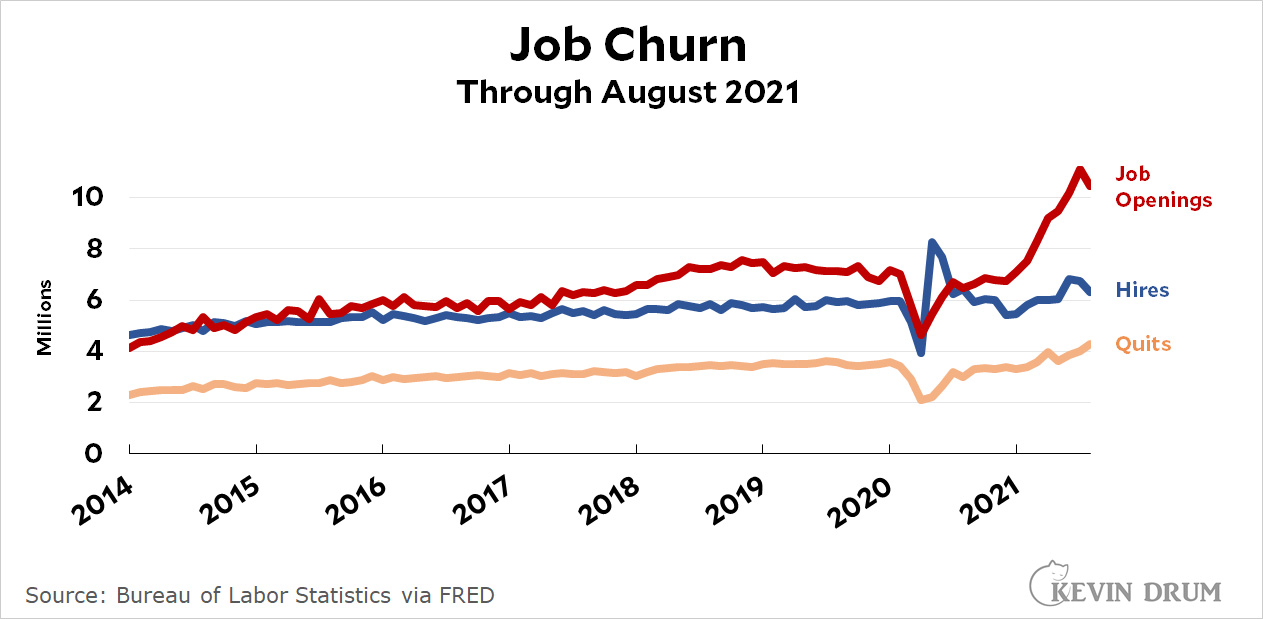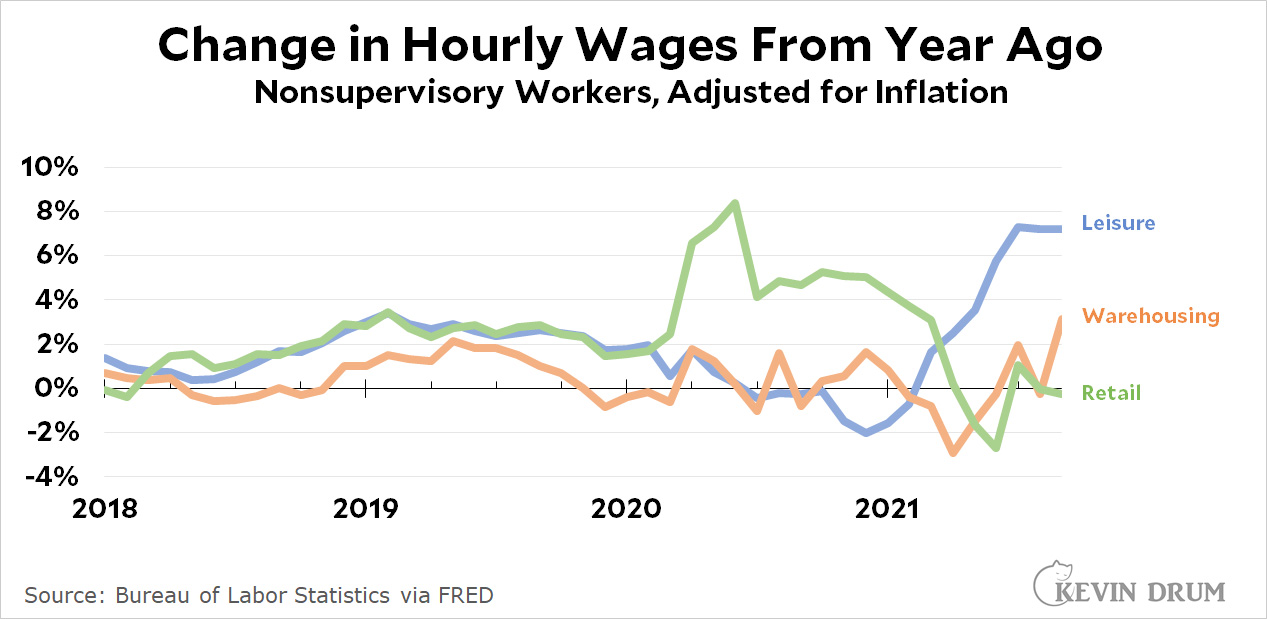Tomorrow is inflation day, but to keep us occupied until then we got new JOLTS data today for the month of August:

These numbers are peculiar: there were about half a million fewer jobs filled than in July (fewer hires + more quits) but that didn't cause job openings to increase. It caused them to decrease by about half a million.
Meanwhile, during the last 12 months quits have increased by 1.3 million. It sure doesn't look like people are worried about finding another job even though the number of hires is lower than it was a year ago.
The job market seems to make little sense these days. People are quitting their jobs in increasing numbers, which is normal during an economic recovery, but employers aren't hiring more people—which is very much not normal during a recovery. So what happened to all these people who quit their jobs? Why didn't employers try harder to keep them? And is the gap between job openings and hires really as huge as it seems?
The conventional theory at the moment is that workers are "holding back," living off their sweet government bennies while they look for better jobs. Increasingly, though, this doesn't make a lot of sense. I mean, sure, a lot of the jobs on offer are crappy—fast food, retail, delivery, etc.—but are there really millions of people who are convinced they can do better just because a year has passed? That strikes me as a surprisingly unrealistic view of things.
As for employers, a huge gap between job openings and hires should prompt them to offer sharply higher wages. Within traditional low-wage industries, there's evidence of this in leisure and hospitality, but not elsewhere:

Hum de hum. If it seems like I'm rambling, it's because I am. I truly don't know exactly what to make of all this. It's almost as if workers and employers are playing a game of chicken, waiting to see who caves in first.

Based on commentary from LinkedIn, there's a LOT of frustration from job applicants who are getting passed over by AI driven recruitment. Employers aren't finding candidates because they have unrealistic requirements and anyone who doesn't check all the boxes gets turfed out.
I suspect the cash economy is where quitters have landed. Roll into that: a bunch of retirements, 700,000 deaths from COVID, and parents who've left the workforce for child care issues.
The revolution happening down in the service sector is another thing entirely and has been a long time coming. Service sector workers were the first furloughed while their employers took funds to keep themselves afloat. They got burned. Those that remained employed were stuck on the front lines where they had the greatest exposure to infection. Then, to rub salt in the wounds, they got spit on, yelled at, and shot at by anti-masker zealots. They've had enough of making other people rich at their own personal risk.
Employers might be raising wages some, but they're stuck either raising prices to balance or taking a profit hit. Companies with shareholders aren't going to stomach a profit hit.
So, we have a stalemate.
OnlyFans is the new Manpower.
Lots of "hiring" signs here in local groceries. Maybe low-wage, low-skilled workers are moving from, say, retail, to leisure or other area where wages and benefits, along with hiring bonuses, have gone up?
Around here, lots of parents can't really go back to in-person jobs until kids are regularly in school. If 5-11 vaccines approved, I predict worker shortage will ameliorate.
Leisure and hospitality are not in competition with online or overseas. So they have a much better shot at passing on wage increases to customers.
Retail is supposedly in a death struggle with online. So it seems unlikely they could pass-along wage increases.
Warehousing to at least an extent can turn to greater automation.
Yeah, the issue is female workers. Retail workers, the shortage isn't noticeable, but in food service it is. Manufacturing should be back go to normal soon.
Reminds me of something I read once about the very high level of small business formation in Norway during the several decades where it had a very permissive unemployment system (big oil revenues at the time). People used the program as kind of a small business grant that would pay the owner's salary for the first year or two.
GI bill after WW2 would be another vaguely similar time. It wasn't just education, one could opt for a lump sum to get a house or start a business and many did.
I wonder if “long covid” has any affect on this. According to some estimates nearly 25% of covid cases result in “long covid”. That would be over 10 million people. “Long covid” seems to be pretty widely defined. With cases some having symptoms over 30 days after it has left their bodies but no indication that I see of how many have symptoms lasting many months. Still, that would be a lot of people who are perhaps looking for work that doesn’t involve too much public contact.
"That strikes me as a surprisingly unrealistic view of things."
I was talking on Friday with a local restaurateur who had a story about one of his wait staff. She waited tables to pay the bills, but she was an artist as her calling. Then she started to be actually successful at it. She scraped enough money together for a studio. She became an assistant to a local muralist.
And so she walked into the restaurant one day and say she was quitting to go to LA. He pointed out that her career was just starting to move forward, and she's basically going to throw that all away to move across the country and start over. She said "When you put it that way, it doesn't sound very smart."
Unrealistic people are unrealistic. Realistic people find that baffling. Welcome to humanity.
Our local mass transit bus company has started an On Demand ride service. $2 per ride. Small type min van. Directly competing with Uber and Lyft. They have 3 vans right now but demand for a $2 ride has exploded.
Interesting use of taxpayer monies. The mass transit buses were usually empty. These vans are normally full.
Interesting
How much more reliable are the vans compared to the buses?
Having spoken to a large number (at least 20) job seekers in the last few months, here's my anecdotal takeaway. The traditionally paying low-wage service jobs are absolute hell right now with how political things are, and no one wants to be shot at for $8 an hour because they told someone to wear a mask. The better paying jobs all have unreasonable expectations. There's a tech job I know in town that recently went unfilled because the company wanted someone with 15+ years of experience, but wanted a background in things that only young 20-something people are commonly getting, and wanted to pay a salary more appropriate for a brand new 22 year old college grad with zero experience.
The issues with the tech job requirements are nothing new: firms have been posting unrealistic job requirements for a long time. I wonder a but cynically is the purpose is to reduce the number of resume submissions. ever since job listings when online and not just in the pages of a local newspaper submissions have become overwhelming.
Heh. I remember when Java was the hot language, back in the day. Clueless higher manager types were demanding at least five years of experience ... in 1998.
"It's almost as if workers and employers are playing a game of chicken, waiting to see who caves in first."
That's exactly what's going on. You've answered your own questions on why the job market is so screwy.
I can recall back in in the recession of the early '90s stories about how there were long lines of people applying for one measly cafeteria job at a school building because there were literally no other jobs available at the time. Now, with all those "Now Hiring" signs out there, any worker is going to feel confident, so long as they can survive, they can hold out that they can get the kind of job they want in terms or pay, hours and work conditions. If they can't, those jobs go unfilled. So it truly is a standoff. Call it "The Unknown Strike".
Will this change if say, vaccines become available for young kids and some parents feel more confident sending them to school? Perhaps but we were also told when unemployment benefits were ended there would be a steady stream of job seekers out there snapping up what was available. So that didn't happen and now we're hearing people actually quitting and looking for better jobs. I mean what can you say? So long as there is a large pool of labor unwilling to work unless its right for them and so long as the GOP restrictionists say no to immigration (although that's basically what the Biden Administration is doing too for political reasons), jobs will go unfilled and businesses will be short staffed. Simple as that. Something's got to give and what that is is and when that will come is hard to say.